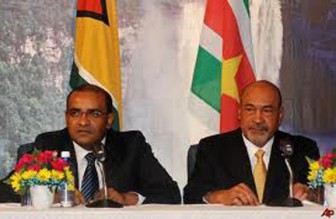It was neither an offhanded nor a flippant remark. It was a profound foreign policy statement, an articulation of the Jagdeo administration’s disposition to the Bouterse administration and to Bouterse himself. The president was neither hesitant nor ambiguous in response to the enquiry by a so-called foreign power; about arresting Bouterse, though depending on which section of the media you read or listen to you get different impressions as to whether the exchange with the emissary of the “foreign power” was done in a formal setting or whether it was a response to an informal question.

Be that as it may President Jagdeo would have laid to rest various enquiries regarding the future of relations between Guyana and Suriname under Bouterse. The former army sergeant has been hounded by a past tainted by allegations of human rights transgressions during his earlier period as a military strongman and by claims that he has been a drug dealer. Certainly, in the wake of his election to the presidency the Dutch let it be known that as far as they were concerned he was still a wanted man. Among Caricom member states there appeared to be mixed views as to whether Bouterse should be embraced as ‘a Caricom brother.’ The Jamaican media, particularly, appeared less than enthusiastic about the newly elected Surina-mese President.
In the particular case of Guyana assessments of the government’s likely response to Bouterse’s election to the presidency went beyond his alleged human rights transgressions and his reported involvement with drugs. First, there was the question of the long-standing territorial dispute between Guyana and Suriname and whether there was any likelihood of a significant shift, one way or another, in bilateral relations under Bouterse’s presidency. Another school of thought sought to make the point that Bouterse himself had traditionally been hawkish on Suriname’s territorial claim and that Guyana should at least assume a cautious posture in the wake of his election to the presidency.
President Jagdeo, it appears, had no such qualms about the Bouterse presidency as his three visits to Guyana has demonstrated. More than that bilateral talks between the two countries have extended as far as a proposal for the bridging of the Corentyne River, an initiative that goes to the heart of the dispute between the two countries. It may well be, therefore, that President Jagdeo saw the election of Bouterse as an opportunity to improve relations with Suriname, knowing that in Bouterse’s particular circumstances he was bound to respond positively to being shown a favourable face by Jagdeo.
On the other hand, of course, Jagdeo would have had to take account of the regional and global responses to his embracing Bouterse and it would appear that he made the simple decision to put what he regarded as ‘the national interest’ first.
The recent revelation that Bouterse had links to now convicted Guyanese drug kingpin Shaheed Roger Khan would not have been good news for Bouterse since it would have placed him once again on the international radar.
Nor can President Jagdeo decouple himself from his professed good relationship with the President of Suriname. What is arguably more than a trifle troubling for the Jagdeo administration is that it has come under criticism for being soft on local drug kingpins. In addition to that, of course, there is the allegation that Khan was actually being facilitated by elements within the state.
But Jagdeo has grown up significantly as a Head of State and his response to the issue of Bouterse raised at the army officers conference suggests that he has no intention of backing away from the issue. Bouterse, he says, is the elected President of Suriname and his current democratic credentials are good enough to withstand Guyana’s foreign policy scrutiny.








